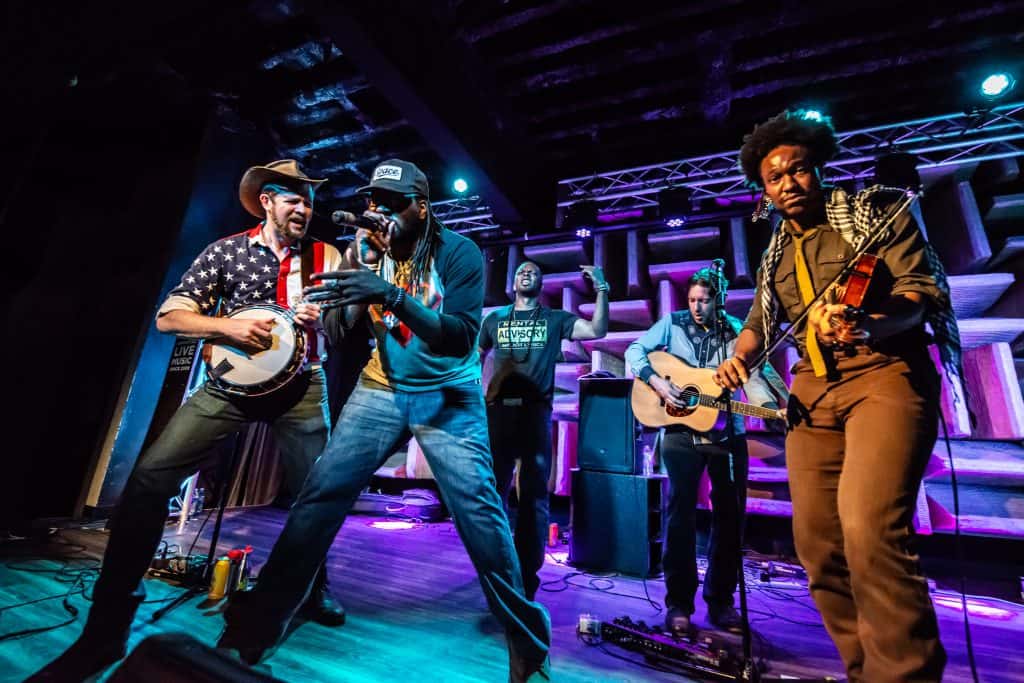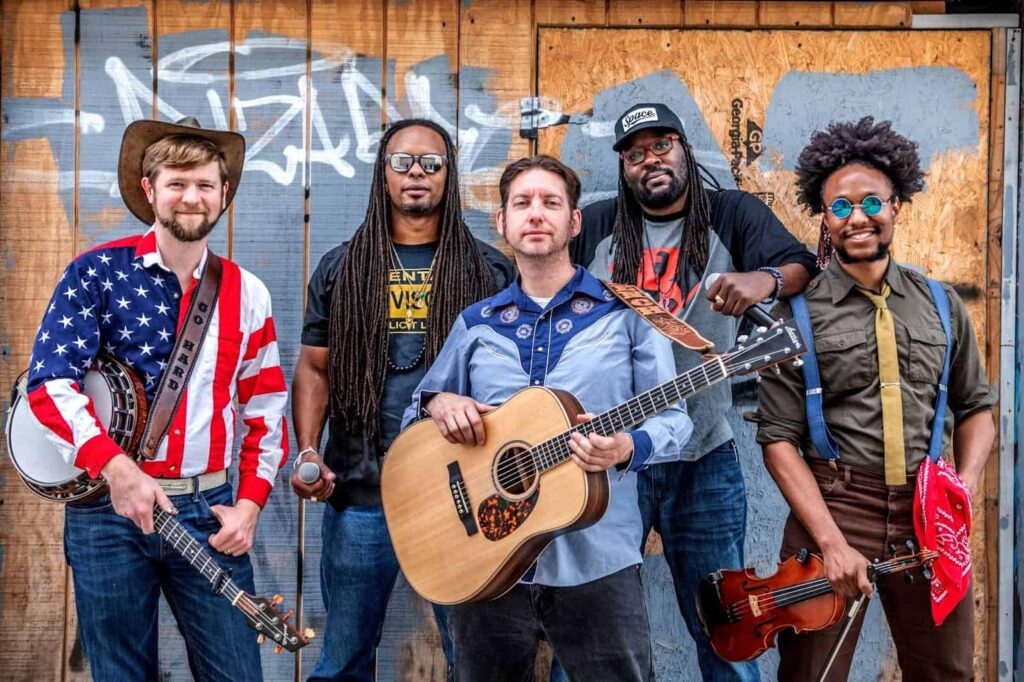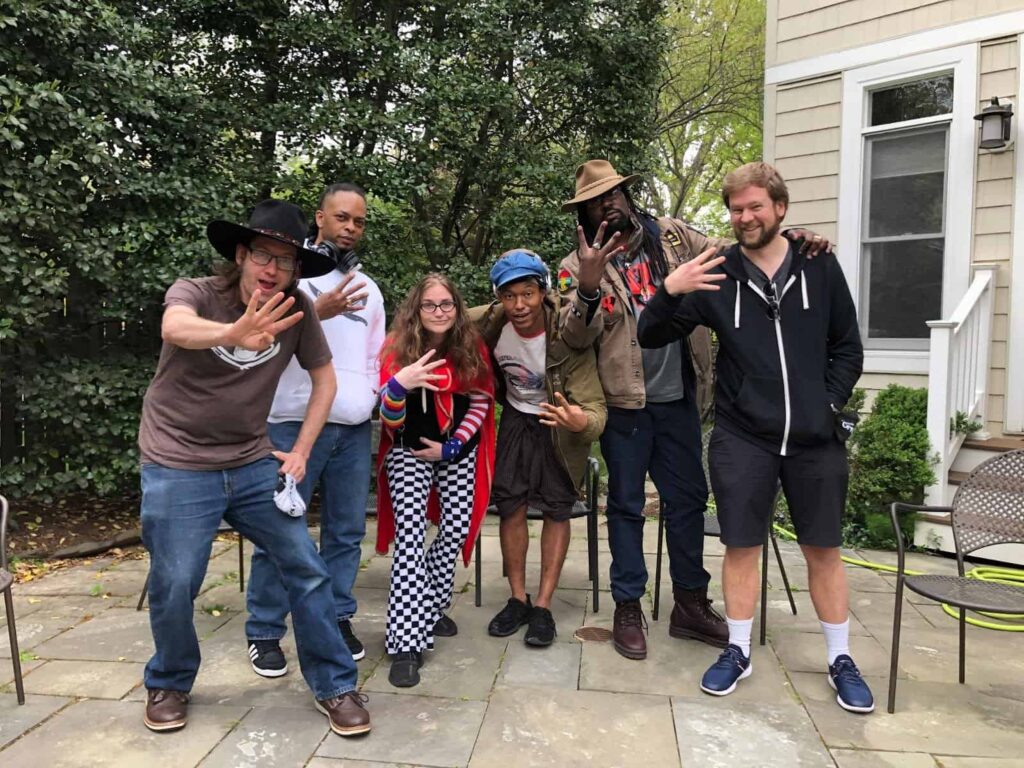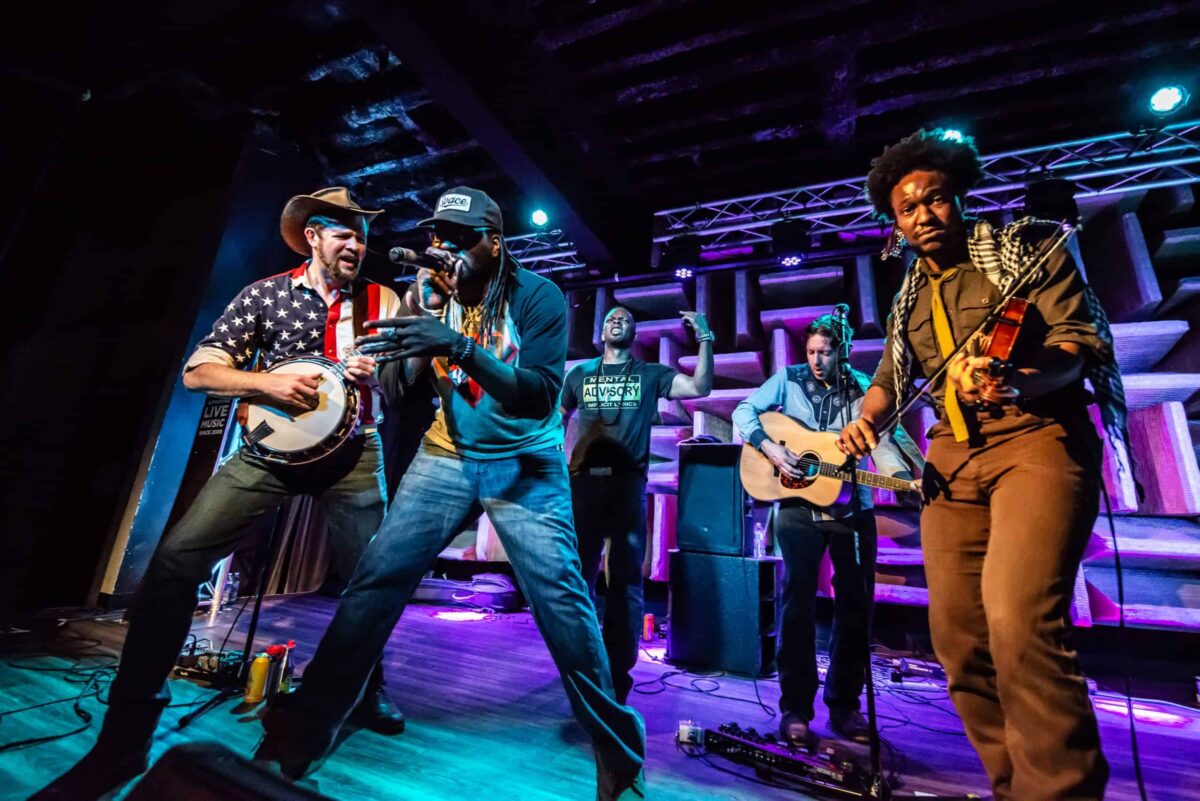By Em Tanner
As we approach the Program Council’s 2023 iteration of Springfest, set for April 22 in the Quigley Bandshell, Top o’ The World staff writer Emily Tanner spoke with the event’s headliner, Gangstagrass.
Band members Rench The Mastermind (audio, guitar, vocals), Dan “Danjo” Whitener (banjo, vocals), B.E. Farrow (fiddle, vocals), R-SON The Voice of Reason (vocals), Dolio the Sleuth (vocals), and “Sleevs” Emily Bernstein Messner (manager) discussed their music-making process, addressed criticisms of the industry, and offered advice to Western students.

Gangstagrass originally formed in 2006 and grew to new heights when their song “Long Hard Times to Come” was chosen as the title theme for FX’s hit show “Justified” in 2010.
That same year, the group’s producer Rench — and collaborator T.O.N.E-z — were nominated for the Outstanding Original Main Title Theme Music category at the Emmys.
Throughout their more than decade and a half of making music, the five-member group has sought to dismantle traditional music-genre narratives while exploring themes of racism and classism; particularly in their 2020 album, “No Time for Enemies”.
Fusing elements of bluegrass and hip-hop, Gangstagrass’ primary goal has always been to bring people together.
The group has released four studio albums since 2010, collaborating with a slew of artists from different musical backgrounds along the way.
As they’ve grown, the band has found themselves topping charts, headlining festivals, and building a loyal and diverse fanbase. In 2021, Gangstagrass auditioned for America’s Got Talent and made it all the way to the show’s quarterfinals.

The process of musical creation
Back in 2006, Gangstargrass creator and producer Rench was inspired to fuse influences of bluegrass and hip-hop into a new sound.
“I grew up listening to a lot of country music and a lot of hip-hop, and I just wanted to hear a lot of those elements in the music that I was listening to,” he said. “I gotta say, when I first started it … I was like: ‘okay, people are going to think this is wild and crazy’ … There are certain people that feel like this is a ‘white’ space, that this is their pure bluegrass music and we’re invading it.”
As a group, Gangstagrass makes a concerted effort to break away from the typical barriers found in music by redefining and blending genres and influences.
“Being in a group like this, it can kind of reaffirm your identity in a cool way. It doesn’t mean you have to rap now … I’m still coming at this thinking [that] I’m just going to play the bluegrass stuff that I really love to play and that comes from my heart. It sort of reaffirms my place because I’m an ingredient, I’m part of the [broader] whole,” said Danjo.
Vocalist Dolio the Sleuth agrees with that sentiment, and expands it to cover the group’s creative process. “One of the cool things about the band is that now we’ve been together so long to where we have many different approaches to how the songs get created and we’re at the point where everybody in the band is contributing equally.”
While vocalist R-SON says that his approach can be more structured, Rench believes that bringing in more influences allows the whole band to be a little more adventurous. The group enjoys the freedom to freestyle and build off one another during performances because they trust in each other — and in the creative process.
Some songs spring into life as beats or snippets of ideas, while others form over time through noodling (i.e. playing around with instruments) and freestyle.
Gangstagrass’ latest and sixth studio album, “No Time for Enemies”, was recorded separately due to the COVID-19 pandemic and mixed together by Rench, but fans would never know just from listening, a testament to the group’s creative cohesiveness.
The Gangstagrass way
“We play small, hole-in-the-wall venues; we play, you know, campsites … hole-in-the-ceiling venues,” said Dolio. The group truly has seen it all — performing everywhere, from caverns to international stages.
“My favorite venues are always the ones where someone pulls out homemade moonshine and passes it around,” said Rench.
Due to the free-styling nature of their music and performances, the group emphasizes the importance of communication, strengthened by more than six years with this lineup. That strong basis affords the group additional freedom on stage — and in the recording booth.
“Over time, our sound has [become] more of a blend as opposed to more of a meeting,” said Dolio.

Changing the industry for good
In the mixing of music styles and addressing contentious topics, Rench explains, “It’s been a really big learning experience … to be delving into the history of our genres and finding out how much there’s been this artificial segregation. You know, country music is not ‘white’ music if you really go back in the history and look at it. Everything was a lot more integrated than we were led to believe.”
“Those genre divisions are artificial and they were created by the record industry because they thought that would make them money in the Jim Crow era,” added Sleevs, the band’s manager.
Dolio also chimed in, explaining that “because of the artificiality of the barriers, the backlash doesn’t seem anywhere near what we thought it would’ve been … the folks that are just really, really loud and wrong about it; they’re just not going to like it no matter what it is … [but] separating people’s taste has always been about money.”
”The backlash is small … it is very, very small, it is very, very rare,” echoed R-SON. “You don’t get a whole lot of it. But, every now and again, you know, folks will go to extremes and you just sort of have to blow it off and be as amused by it as you possibly can otherwise it’s terrifying … [then] you go do a show for like ten thousand people and they’re all losing their minds and you get past it.”
Of course, consistently topping the bluegrass charts likely doesn’t hurt Gangstagrass’ credibility within the genre — neither does the group’s focus on the positive aspects of creativity.
Building community
A staple of Gangstagrass is the group’s commitment to community, which is on full display in “No Time for Enemies.”
“There’s a lot of talk that goes on. There’s a lot of, you know, people speaking to a mission and speaking about the issues,” advised Dolio. “But what really moves the needle is action. Vote in every election … the needle does not get moved from the couch, a tweet is not going to get somebody elected.”
“I know things are hot right now all over the country, especially for the young folks. The reason they are actively trying to suppress the youth vote is [because] younger voters are the ones who are going to have to live with the consequences of what these legislators are voting [for]. So, it behooves you to get out there and make sure your voice is heard,” he added.
“Study organizing because a lot of it’s gotta happen off the screen and face to face,” added Rench, who advises young people to go further in their education, advocacy, and activism, pushing the boundaries of the possible, saying:
“You gotta arm that action with understanding. I understand it can get tiresome to vote for these folks that you don’t completely believe in, but as you’re participating, as you’re voting, as you’re pushing this system forward; you participate and then you also defenestrate — throw this old system out the window and understand how it works so you can make it better.”
Connecting to history
The group’s members are well-versed on the history of music — the artificial constraints and siloing of genres — and how a long, dark history of racial discrimination impacts the music industry, the creative industry, and our nation’s politics.
To further understand that complicated history, and to delve into the music that has inspired and driven them, the group offered up some suggestions for further education:
R-Son recommended J Dilla —“Arguably the greatest producer in the history of hip-hop music, even your great producers will tell you that.”
For his part, Rench suggests reading Segregating Sound: Inventing Folk and Pop Music in the Age of Jim Crow by Karl Hagstrom Miller; a book about redlining and segregation within the music industry. He also recommended a podcast by a personal friend, Rissi Palmer, called Color Me Country, which “gets into a lot of [history] and plays music from various people to show the interconnectedness of all that music.”
Danjo curated a Spotify playlist called Women of Color in Bluegrass and Old Time, explaining that “people were putting together different playlists and acknowledging various people and different things, and I realized that there was not yet a playlist that I could find that focused on women of color in bluegrass and old time music.”
Dolio offered up another book: Blackout: My 40 Years in The Music Business by Paul Porter, which explores the impact of distribution networks and corruption.
“Look out for anything Eileen Southern when it comes to the roots of music in the United States,” said Farrow. Otherwise, he recommends reading about Duke Ellington: “He has a bunch of stories about old jazz musicians that are really funny.”
To hear from Gangstagrass, you can check them out on the Southern Songs and Stories podcast, and in Wide Open Country.
Dear Gangstagrass: Advice from the band
To conclude, the Gangstagrass imparted young Western students with some life advice, starting with R-Son, who repeatedly shouted: “Maintain your credit!”
Danjo spoke to the importance of the collegiate years for personal growth, offering: “You’re building and growing throughout your life … and the stage that you’re in right now is a very exciting one. I mean, you look ahead — if you’re like me — and you look ahead to people who are in late stages of their career and lives, and you look at all the things they’re accomplishing that you think my God, this is amazing … but I look back and I think [college students] are really laying a foundation or planting roots. You’re establishing a network, meeting a lot of people… the community you make now is really going to follow you for the rest of your life.”
“Take your biggest dream and amplify it. Every year, the possibilities become even more expansive. If you feel that your ideas are too lofty to achieve then good because that leaves something to aspire to … this is an abundant world,” added Dolio.
Sleevs concluded the group’s advice, offering:, “If you’re uncomfortable with something, don’t avoid it. Avoiding it is just going to make it worse, it’s just going to make it feel bigger and scarier, and it’s just going to narrow your worldview more and more.”

Keeping up with Gangstagrass
SpringFest will be held on Saturday, April 22 starting at 4 p.m., following the Earth Day Barbeque. With Gangstagrass anchoring the evening, the event will kick off with a performance from Tatanka.
After Gangstagrass, the evening will conclude with an aftershow presented by Kamakani.
You can follow Gangstagrass on YouTube, Spotify, Instagram, Facebook and TikTok.
They look forward to seeing you at SpringFest!
Thank you to Gangstagrass members Rench, Danjo, Farrow, R-SON, Dolio, and group manager Sleevs for taking the time to speak with Top o’ The World!

